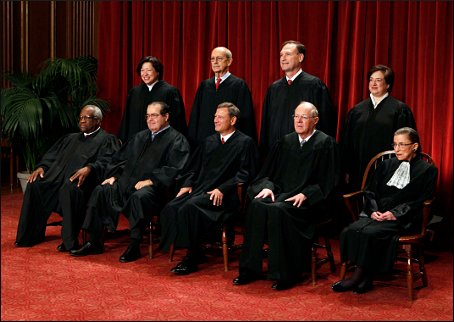Romney’s Plan for an Ultra-Conservative Supreme Court

Governor Romney promises to “nominate judges in the mold of Chief Justice Roberts and Justices Scalia, Thomas, and Alito.” The most striking thing about the list is who isn’t on it: Reagan appointee Anthony Kennedy.
Kennedy actually has joined the four most conservative justices often – for instance, he wrote the majority opinion in Citizens United – but apparently that isn’t good enough for Gov. Romney. To understand Gov. Romney’s vision of the Constitution, we need to look at the cases where Kennedy differed from the other four Republican justices. Those are the cases where Romney’s nominees would vote differently and potentially change the law.
Reproduction and sexuality are one key area of difference. Kennedy has adopted the view that states may regulate abortion – for example, by banning “partial birth” abortions – so long as they do not impose an undue burden on women’s right to choose. The conservatives believe that that states have a free hand to ban abortion. Kennedy also ruled that state cannot criminalize homosexual acts by consenting adults in private. This ruling builds on earlier decisions that protected (among other things) the right to use birth control. Gov. Romney echoes conservative attacks on those opinions when he lambasts the Court for “creating entirely new constitutional rights out of ‘penumbras’ and ‘emanations’ of the Constitution.”
In the area of church and state, Kennedy has also sometimes differed from the conservative bloc, though he has often joined them. For instance, he voted to hold that a county could not display a Christmas crèche inside a courthouse. He also wrote the opinion finding that schools could not sponsor prayers at high school graduations.
In general, Kennedy has been more willing to open the courthouse doors more widely than his more conservative brethren. For instance, he ruled that the state of Massachusetts had standing to sue the Bush Administration over an issue relating to climate change. He agreed that the state had standing because climate change will cause sea levels to rise, eroding the state’s coastline. Kennedy also led the Court in holding that detainees at Guantanamo must have access to the federal courts, and he joined opinions giving detainees the right to a fair hearing about their guilt as terrorists.
Another area of disagreement between Kennedy and the other four is the death penalty. Although he frequently votes to uphold imposition of the death penalty, he has taken the position that the death penalty can only be imposed for murder, and that it cannot be imposed if the defendant was under 18 when the crime was committed.
This summary of his opinions might give the impression that Justice Kennedy is a liberal. That is far from true. For instance, he is a solid conservative vote opposing affirmative action, gun control, and regulation of campaign finance. But he does deviate from the conservative bloc now and then, and these deviations have sometimes made a big difference. Gov. Romney rejects any deviations from conservative orthodoxy.
In short, by displacing Kennedy’s role as a swing voter, Gov. Romney’s nominations would change some key legal doctrines. Prayer and other expressions of religion would be more freely allowed at school events and on government property. The Constitution would no longer be interpreted to block states from banning all abortions, putting homosexuals in jail, or executing juveniles.
Conservatives may view these changes as long overdue, while liberals will view them with dismay. What is clear, like it or not, is the direction that Gov. Romney wants to take the Court. Rather than being a moderate on constitutional issues, Gov. Romney has pointedly rejected the possibility of nominating another center-right justice like Anthony Kennedy.




